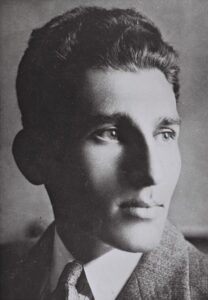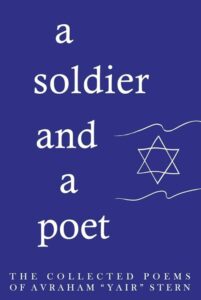
Avraham Stern wrote a poem that became an anthem
Avraham Stern (1907-1942) published only nine of his 40 poems in his lifetime, but he became one of his country’s most famous poets.
Stern was born in Poland when it was part of the Russian Empire. He was attracted to and became part of the revolutionary culture that had been developing in Russia since the 19th century but burst into bloom during the First World War, the Russian Revolution, and the Russian Civil War. He traveled to the British Mandate of Palestine in 1925 and attended Hebrew University, enrolling in Greek and Latin Studies. He began to write poetry, reportedly scribbling his verses in the back of a barbershop.
Then came the Arab Riots of 1929. With the deaths of 133 Jews and the injuries to hundreds more, the Greek and Latin scholar and poet became a radical. He enlisted in the Haganah, the Jewish military organization that was ultimately outlawed by the British. Increasingly radicalized, Stern became part of the Irgun, an underground group founded in 1931 that advocated use of force to establish a Jewish state.

Avraham Stern
The Irgun carried out assassinations and terrorist activities against the British, including through the years of World War II. Executions by the British were answered with assassinations and murders by the Irgun. Two of the group’s more spectacular actions happened after Stern’s death: the bombing of the King David Hotel in Jerusalem in 1946 and the capture of the prison in Acre in 1947.
Reflecting his new life, Stern’s ideas on poetry changed. What he’d previously considered creations of beauty became stones of ammunition. Poetry would be enlisted in the fight against the British and for the creation of a new nation. He wrote this poem in 1932 and set it to music; it’s also known as “Unknown Soldiers.”
Anonymous Soldiers

Surrounded by terror and death.
For the rest of our lives we are enlistees,
Discharged from the ranks with our last breath.
On days red with blood and atrocities,
On nights black with despair,
We’ll raise our flag in the towns and cities;
On it, “Defend and Conquer” will appear.
Not whipped and drafted in slavery,
In foreign lands to see our blood stream,
Our desire is to be forever free!
To die for our people—our dream.
Myriad obstacles in every direction
Cruel fate placed on our track;
But neither enemies nor spies nor prison
Will ever hold us back.
If in the streets or in our homes we fall, dead,
And at night are buried unobserved,
Thousands will rise in our stead
To forever defend and guard.
The tears shed by bereaved mothers
And the blood of innocent babies spilled
Shall be mortar—and brocks our cadavers—
And this our homeland we’ll build!
Stern was captured by the British in 1942 and executed in prison. His words, however, continued to inspire the fight for independence, which happened in 1948. His collected poems were first published in 1950, and they’ve gone through many editions in Israel. This most recent edition, A Soldier and a Poet, was published in 2024 and the poems translated from the Hebrew by Zev Golan.
We don’t excuse terrorism, and Stern was certainly a key part of an organization known for terrorism. His poems lean to the patriotic and openly polemical; his focus was the creation of a Jewish state, and nothing would stand in the way of that determination. He didn’t live to see independence realized, but his poems are a reminder of a violent time and one man’s commitment to a dream, without counting the cost.
Photo by Robert Elsmore, Creative Commons, via Flickr. Post by Glynn Young.
How to Read a Poem uses images like the mouse, the hive, the switch (from the Billy Collins poem)—to guide readers into new ways of understanding poems. Anthology included.
“I require all our incoming poetry students—in the MFA I direct—to buy and read this book.”
—Jeanetta Calhoun Mish
- Poets and Poems: Autumn Williams and “Clouds on the Ground” - November 20, 2025
- The Manuscript of “The Waste Land” by T.S. Eliot - November 18, 2025
- “The Summer We Crossed Europe in the Rain” by Kazuo Ishiguro - November 13, 2025

Leave a Reply